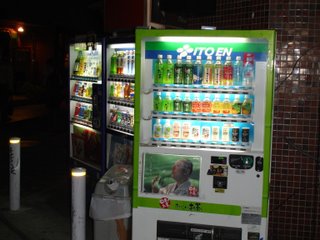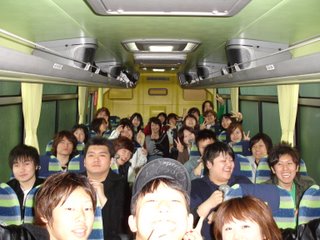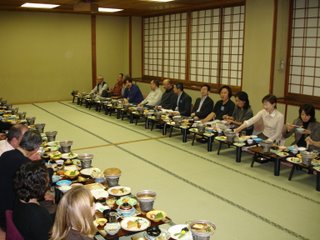Week 4 & 5: Thanks a lot, Japan


The convenience of a bike has also become something I take for granted everyday when I stay up late the night before and have to ride into work in five minutes rather than twenty. But biking here is far more dangerous than anywhere else I have every ridden a bike, more so than on
So of course I have to go on my bike to do everything, even pay the bills. Here is another point of contention that I have with
In the event that you should lose power, feel free to drop an F-bomb or two in the comfort of public space. Seriously, I am starting to worry about my language around the people who will casually say fucking to describe just about anything. My personal favorite story about someone here using fuck was at work when Joanne burned her hand getting boiling water for her tea and screamed Motherfucker. You just assume no one is listening to you cause, chances are, no one is because they can’t understand you anyway. Imagine if I am here for a few years, how would it be if I come home, went to Buca’s, and talked about how fucking good their fucking garlic potatoes are.
 Before I actually started teaching, however, there was a messy little process called: The Oral Placement Interviews (OPIs). This is immediately following the written placement tests where all the VFMs had to get into suits and walk around a lecture hall while a tape played conversations. I was rather happy when Paul, a part time teacher in another area read who hales from
Before I actually started teaching, however, there was a messy little process called: The Oral Placement Interviews (OPIs). This is immediately following the written placement tests where all the VFMs had to get into suits and walk around a lecture hall while a tape played conversations. I was rather happy when Paul, a part time teacher in another area read who hales from The interviews themselves take place in the same room as the class itself. I am teaching two sections of FE, Economics and International Relations, both are listed on the same level but I would soon find that there is a world of difference between their skills. A student sits across from me with a camera fixed on his or her position in case I do have to send them off I have record and can justify my decision. Each interview lasts for about five minutes and consists of questions that are very simple but get harder as the students’ level of English shows promise. For my interviews I had to do both sections of FE on the same day, so that’s 42 students that had to be interviewed in five minutes, graded, and moved if necessary by the end of that evening. I have to admit here that after a couple of hours I was beginning to wonder if I would get in trouble for asking over their head questions like, Have you ever been convicted of a felony? What makes you qualified for semen donation? Does
The Miami Vice look is just one part of a whole fashion trend that seems forever trapped in the 80’s. Much of the style here seems borrowed from the glam rock, punk, and angsty teen look of 20 years ago with some modern technology like cell phones and a sexual edge that would turn the farthest right-wing Christian a cold shade of green. Between classes in the restrooms guys, yes, guys, will spend several minutes making that cowlick they call a hairstyle look perfect and that random patch of blond behind their ears isn’t buried under a drooping spike. The girls on the other hand are comfortable showing as much leg as possible that the occasional ass cheek hanging out is a fortunate accident. There is a girl in my sophomore English class who has to carry a towel around to put on her lap when she sits so her crotch doesn’t show. Not to worry, since almost none of the boys are babe hounds who spend the majority of class trying to pick up their neighbor. You’ll actually have a hard time getting boys and girls to voluntarily get into a group together. How’s that for weird?
A couple of IR students stood out immediately as my favorite for a few reasons. The first was a guy who looks exactly like Alton Brown’s illegitimate Japanese son. This is not just some weird comparison, but the guy wears the same style button-down short sleeve shirts, glasses, and hair as the man on TV. I remember there was an episode of Good Eats where
For FE I am teaching both classes out of the same book, from the same lesson plan, and using a lot of the same materials. The book has 12 units that are taught over the course of the year, six per semester. The problem is that most of the IR students are so far ahead that each unit four pages of content cannot be stretched out to occupy them for two weeks, let alone a single class, so I have to improvise a lot of my materials. Already I have found that the IR students can handle about twice as much work from the combination of knowledge and drive they possess.
And to everyone I told I was teaching economics and international relations, I'm sorry. I was mistaken. AU offers majors in four categories, economics, international relations, law and business. While my schedule said Econ 11, it actually meant that all of the students in the class were economics majors in a freshman English class. And here I was thinking I would have to teach basic math skills and add a dollar sign. Economics students have to learn English as part of the school’s mission to spread internationalism and because it is becoming a Universal language, but there is a good chance they will never use it. IR students learn it for the same reasons but also because they want a job that deals with foreigners and are soon traveling to
A shift occurs midweek for the schedule when the Econ students go to another room and get taught by another professor with a different book. They are still learning English, but in another class. For the econ kids I have found that it is best to ignore the day and pick up right where I left off. For the IR students on the same plan, there is an extra day per week, or Fifth Day, that I have to fill in with an alternate activity. After a slew of suggestions, good ones including one that is being published later this year in a textbook, I decided to steal (yeah, I’m not even going to deny it) pronunciation drills involving L and R sounds alternated with survival English scenarios like going through customs and ordering food in a restaurant. The first pronunciation drill went really well considering all I had them do was sit in a circle and say words like lung and rung for 45 minutes, but even after one day I could hear a different in their speaking.
In addition to the English, I also have a couple of communication (comm.) courses, creative writing and general communications, where I have free reign to teach whatever I want. The writing course looks to be a lot of fun since the students want to be there, even though it is hard to talk about poetry and fiction well in another language, let alone as freshmen. I was a little offended when only 13 people showed up on the first day, one left as soon as I wrote writing on the board, three more left when I said the class met twice a week instead of once, and then only eight have come consistently ever since. They are from different levels of English, but they seem to understand pretty well when we read together. The reading part of the class doesn’t lose them as much as the analysis, but they are getting better. Now I just need to get them to write more.
All of this has got me thinking about a girl I met a little over a year ago that I thought was less intelligent (ok, stupid) for how she talked, but never considered the fact that her job as a nanny made her that way. There are a lot of things you have to adjust in order to work with someone who communications skills are far lower then yours. One skill you have to learn fairly early is how to recognize a look of incomprehension. The students feel somewhat obligated to appear understanding, even if they have no idea what you just said. I can (and have, I assume) go through an entire lesson and not get anything across. Eventually you learn to give up polysyllabic words, jocular expressions, and speaking at a normal clip like your talking to a young child. I now am filled with a great deal of guilt for having been so impatient with her and can only hope that in the future someone will find the patience to speak to me without judgment.
The other comm. class is to get other IR students ready for going overseas. I had about 90 students show up and was advised to only allow 30 in, and this number would pare down to about 25 as the semester goes on. With such a large group from various levels meeting only once a week I feel as though I cannot get anything across. This may become a basic conversation class with a lot of movies and music to fill the gaps. As the days grow nicer I develop the desire to send them out to speak English with whomever they come in contact with just to see what happens. This is the foreigner experience, you might as well get used to it now. But all of the students, despite repeated warnings from my superiors, are very nice. The worst they can do is look bored, and for some that seems to be a more a genetic condition than a state of mind.
 The last class I teach is Sophomore English for IR students. Most of these kids have just come back from a semester in
The last class I teach is Sophomore English for IR students. Most of these kids have just come back from a semester in
The night I first got here Russell asked me if I was pretty good with computers. A bit of a random question since I just met the guy, but later I found out that the head of the computer committee (CAI) had gotten a look at my resume, saw that I was experienced, and passed on the info to his VP, Russell. The CDC and CAI are a couple of about 10 committees that work within the CELE department handling various duties from ordering supplies for the office to publishing the in-house journal. Each VFM has to sign up for at least one. Thankfully Karen and Juniper had little interest in computers (well, Karen did consider it for a moment). It’s early yet, so all I have done is coordinate the sign-up for the language and computer labs for the semester, and all that took was putting a calendar together with the correct days selected and emailing everyone about it.
Overall I feel really confident about the whole thing, but there is a nagging fear that makes me hesitate before I go home for the day after teaching. Having come from a whole life of being a student first and an employee second, I feel constantly worried that I am supposed to be overwhelmed with work and putting in countless hours to prepare lesson plans when I am not. On the weekends people with come in for an entire day to sit at their desk and work, while I feel like I have the next few days ready in a couple of hours. Am I doing something wrong? I hope not. But I’m new at this, so getting into a groove is maybe what I am doing now. We’ll see.









